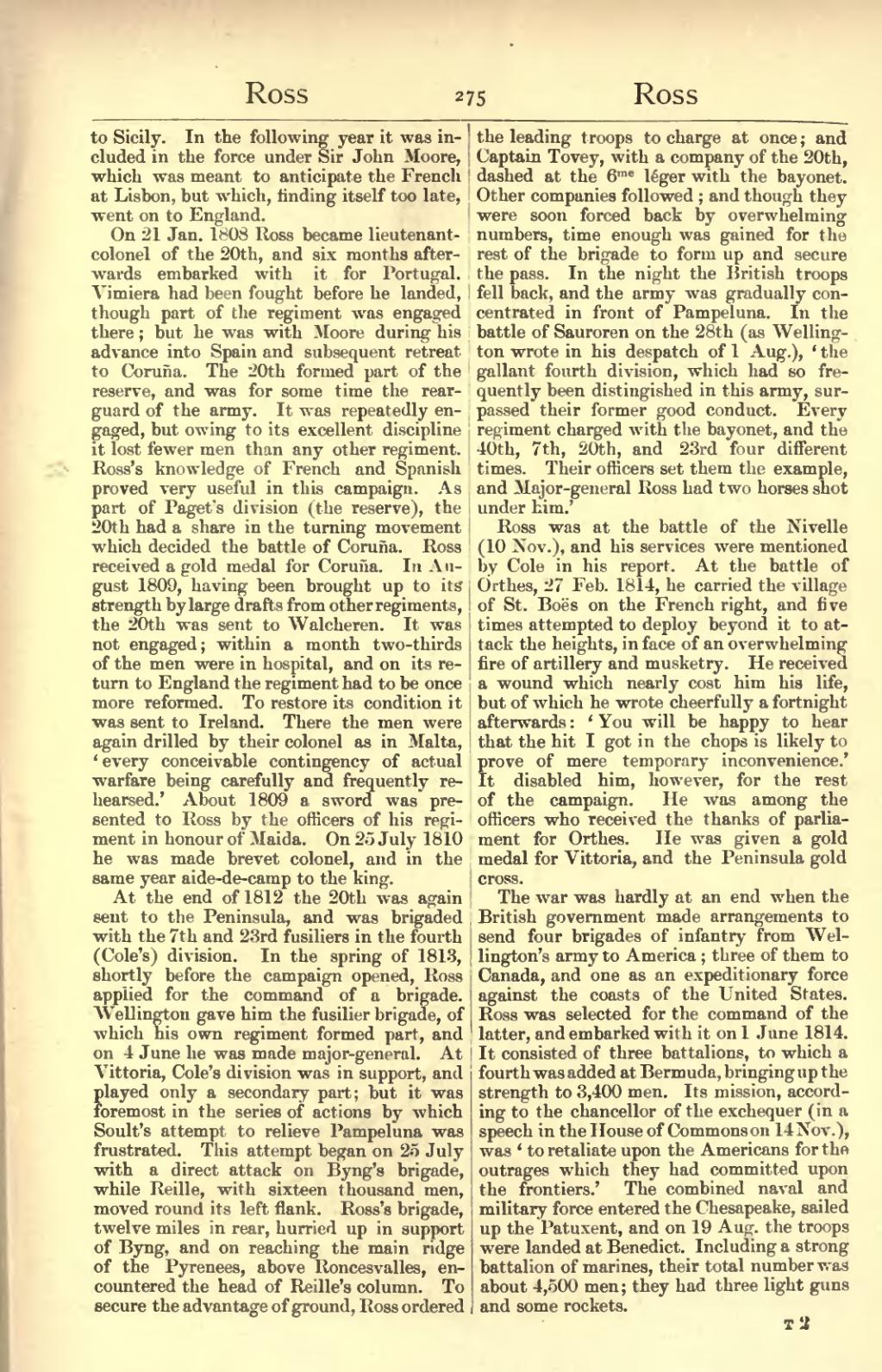to Sicily. In the following year it was included in the force under Sir John Moore, which was meant to anticipate the French at Lisbon, but which, finding itself too late, went on to England.
On 21 Jan. 1808 Ross became lieutenant-colonel of the 20th, and six months afterwards embarked with it for Portugal. Vimiera had been fought before he landed, though part of the regiment was engaged there; but he was with Moore during his advance into Spain and subsequent retreat to Coruña. The 20th formed part of the reserve, and was for some time the rearguard of the army. It was repeatedly engaged, but owing to its excellent discipline it lost fewer men than any other regiment. Ross's knowledge of French and Spanish proved very useful in this campaign. As part of Paget's division (the reserve), the 20th had a share in the turning movement which decided the battle of Coruña. Ross received a gold medal for Coruña. In August 1809, having been brought up to its strength by large drafts from other regiments, the 20th was sent to Walcheren. It was not engaged; within a month two-thirds of the men were in hospital, and on its return to England the regiment had to be once more reformed. To restore its condition it was sent to Ireland. There the men were again drilled by their colonel as in Malta, ‘every conceivable contingency of actual warfare being carefully and frequently rehearsed.’ About 1809 a sword was presented to Ross by the officers of his regiment in honour of Maida. On 25 July 1810 he was made brevet colonel, and in the same year aide-de-camp to the king.
At the end of 1812 the 20th was again sent to the Peninsula, and was brigaded with the 7th and 23rd fusiliers in the fourth (Cole's) division. In the spring of 1813, shortly before the campaign opened, Ross applied for the command of a brigade. Wellington gave him the fusilier brigade, of which his own regiment formed part, and on 4 June he was made major-general. At Vittoria, Cole's division was in support, and played only a secondary part; but it was foremost in the series of actions by which Soult's attempt to relieve Pampeluna was frustrated. This attempt began on 25 July with a direct attack on Byng's brigade, while Reille, with sixteen thousand men, moved round its left flank. Ross's brigade, twelve miles in rear, hurried up in support of Byng, and on reaching the main ridge of the Pyrenees, above Roncesvalles, encountered the head of Reille's column. To secure the advantage of ground, Ross ordered the leading troops to charge at once; and Captain Tovey, with a company of the 20th, dashed at the 6me léger with the bayonet. Other companies followed; and though they were soon forced back by overwhelming numbers, time enough was gained for the rest of the brigade to form up and secure the pass. In the night the British troops fell back, and the army was gradually concentrated in front of Pampeluna. In the battle of Sauroren on the 28th (as Wellington wrote in his despatch of 1 Aug.), ‘the gallant fourth division, which had so frequently been distinguished in this army, surpassed their former good conduct. Every regiment charged with the bayonet, and the 40th, 7th, 20th, and 23rd four different times. Their officers set them the example, and Major-general Ross had two horses shot under him.’
Ross was at the battle of the Nivelle (10 Nov.), and his services were mentioned by Cole in his report. At the battle of Orthes, 27 Feb. 1814, he carried the village of St. Boës on the French right, and five times attempted to deploy beyond it to attack the heights, in face of an overwhelming fire of artillery and musketry. He received a wound which nearly cost him his life, but of which he wrote cheerfully a fortnight afterwards: ‘You will be happy to hear that the hit I got in the chops is likely to prove of mere temporary inconvenience.’ It disabled him, however, for the rest of the campaign. He was among the officers who received the thanks of parliament for Orthes. He was given a gold medal for Vittoria, and the Peninsula gold cross.
The war was hardly at an end when the British government made arrangements to send four brigades of infantry from Wellington's army to America; three of them to Canada, and one as an expeditionary force against the coasts of the United States. Ross was selected for the command of the latter, and embarked with it on 1 June 1814. It consisted of three battalions, to which a fourth was added at Bermuda, bringing up the strength to 3,400 men. Its mission, according to the chancellor of the exchequer (in a speech in the House of Commons on 14 Nov.), was ‘to retaliate upon the Americans for the outrages which they had committed upon the frontiers.’ The combined naval and military force entered the Chesapeake, sailed up the Patuxent, and on 19 Aug. the troops were landed at Benedict. Including a strong battalion of marines, their total number was about 4,500 men; they had three light guns and some rockets.
